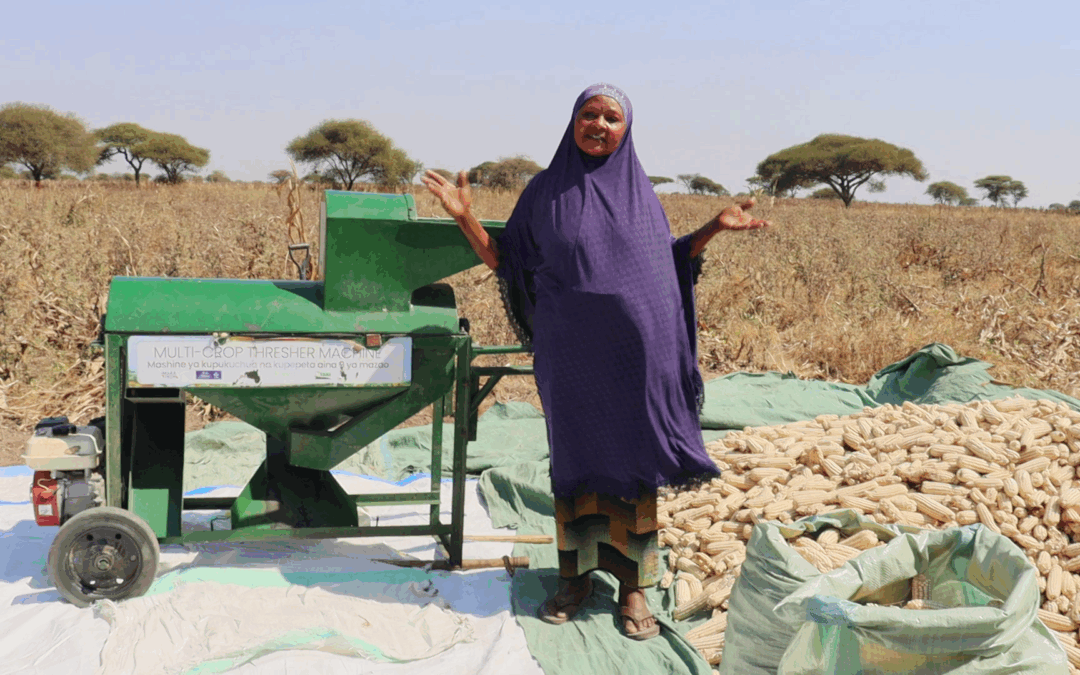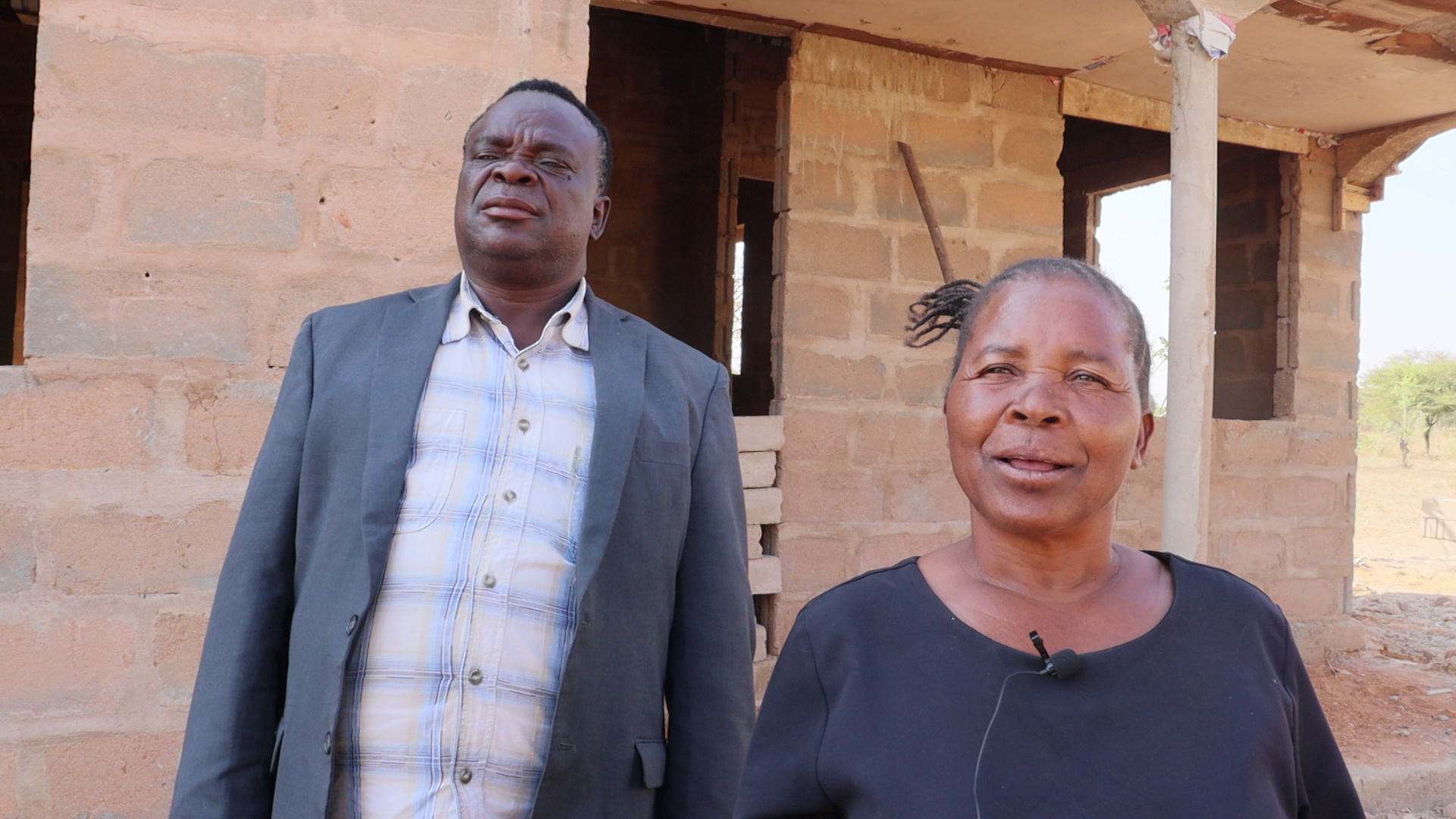By Yohane Chideya, Justus Ochieng, and Radegunda Kessy
For years, smallholder farmers across Tanzania toiled under the sun from dawn to dusk, their hands calloused, their backs bent, and their hopes dimmed by the weight of hard labor. Despite all their effort, profits remained painfully small. Without access to affordable machinery, manual threshing of common beans, maize, or sunflower was an exhausting and days-long task. Grains spoiled easily, post-harvest losses mounted, and dreams of financial progress were left scattered like chaff in the wind.
For Amina Nyange, a mother and farmer from Tanzania’s Dodoma Region, each harvest season was a test of endurance. “I used to depend entirely on manual labor,” she recalls. “It took me days to finish threshing, and I would lose much of my harvest to spoilage.”
Then, one day, things changed. Local youth technicians introduced Amina to a Multi-Crop Thresher (MCT) – a portable machine that can thresh, shell, and clean more than nine crops, from maize and beans to sunflower and sorghum. Developed by Imara Technology Ltd, a Tanzanian company supported by the Alliance of Bioversity International and CIAT through Pan-Africa Bean Research Alliance (PABRA), this simple piece of technology would prove revolutionary.
Within hours of her first use, Amina realized the scale of transformation the machine could bring. What once took her an entire day could now be done in just an hour – faster, cleaner, and more profitable.
“The difference was immediate,” she says, beaming. “I was able to sell cleaner grain at a better price, pay the machine operator, and even save some money. I bought sacks to store my maize and used the profits to support my grandchildren.”
Amina’s story is not unique. Across Tanzania, farmers are rewriting their own success stories with MCTs. In Rubeho Ward, Gairo District in Morogoro, a farmers’ group led by Jonas Senyagwa decided to take control of their post-harvest destiny. The group of 30 members – 77% of them women – pooled small savings from 2% insurance deductions on their loans to purchase a Multi-Crop Thresher worth 2.4 million Tanzanian shillings.
Since May 2025, their machine has processed over 250 bags of maize and 170 bags of sunflower, turning what used to be wasted time and labor into steady income. “We charge 2,000 shillings per bag,” Jonas explains. “The money goes back into our savings and helps women expand their farms. It’s not just a machine, but a lifeline.”
Beyond boosting harvests, the Multi-Crop Thresher has created an unexpected ripple effect in form of jobs. Youth and women, once sidelined in the farming economy, are stepping forward as machine operators, service providers, and entrepreneurs.
For Nitawara Mazani, a young machine operator, the benefits go far beyond income.
“The machine uses very little fuel but does a lot of work,” he says proudly. “My costs are low, my profits are higher, and I can travel between villages to serve more farmers.”
Each harvest season, Nitawara moves from one farming community to the next – a traveling entrepreneur bringing technology, efficiency, and opportunity to every farmer he meets.
Similarly, Brighton Isaac in Dodoma turned mechanization into a thriving business. After working with 107 farmers, he earned TSh 2.6 million shillings, which was enough to buy additional planting equipment, start a small poultry business, and prepare confidently for the next season.
“Mechanization gave me stability and confidence to plan ahead,” Brighton reflects. “Before, I was just surviving. Now, I’m building a future.”
In Northern Dodoma, Paulo Sokoyeti’s thresher processed more than 1,200 bags across five villages. With the income of about TSh 2 million, he now pays school fees for his children and supports his household comfortably. “It has really helped me a lot,” he says, sitting proudly beside piles of his siblings.t
For Milca Msemne and her husband, innovation is the foundation of their dreams. The couple runs a shared threshing service that supports farmers in five villages: Mboringa, Manzase, Fufu, Mlodha, and Namlowa. So far, they have worked with around 30 farmers, helping others ease the burden of post-harvest labor while slowly improving their own lives.
“Whenever we earn a little, we use it to build our house little by little,” Milca says with a quiet smile. “It’s slow progress, but it’s ours.”
Each beam and timber in their half-finished home tells a story of perseverance, powered by innovation and community spirit.
These are not isolated stories. Together, they represent a movement toward inclusive agricultural growth, one that values people as much as productivity.
Through the partnership between the Alliance of Bioversity International and CIAT, Imara Tech, Nafaka Kilimo, farm Africa, AMDT, Agriculture Council of Tanzania, Agri Tanzania, ZOWASEL, Rikolto, TAPBDS, Farm Africa, Briten, QSTEC, Centre for Behaviour Change and Communication (CBCC), THE Dodoma Agriculture Seed Production Association (DASPA) and Helvetas Tanzania, Kibaigwa Flour Supplies (KFS), Mbamba Traders and other partners, dozens of rural entrepreneurs, many of them women and youth, are gaining access to locally made, affordable machines that change how they work and live.
Each thresher is more than just a tool; it’s a catalyst for transformation. It reduces backbreaking labor, cuts post-harvest losses by up to 40%, improves grain quality, and injects new energy into local economies.
As Hosman Ndesamburo from Imara Tech explains,
“Our machines can thresh and clean more than nine crops. They save time and can be moved even by motorcycle. Each operator becomes a small business owner, bringing technology closer to the people.”
From Amina’s humble farm on the outskirts of Dodoma to the bustling cooperatives of Gairo, the hum of threshing machines is fast becoming the sound of progress. This is a rhythm of women and youth empowerment echoing across Tanzania’s rural fields.
What began as a simple effort to ease post-harvest labour drudgery has blossomed into a national story of hope – one that is empowering women, uplifting youth, and transforming communities. As Tanzania’s farmers embrace the power of mechanization, they are not just threshing grain, but a new future made up of dignity, prosperity, and promise.
Cover Image: Amina Nyange stands proudly beside her thresher on her farm in Dodoma
📷CIAT/Yohane Chideya



